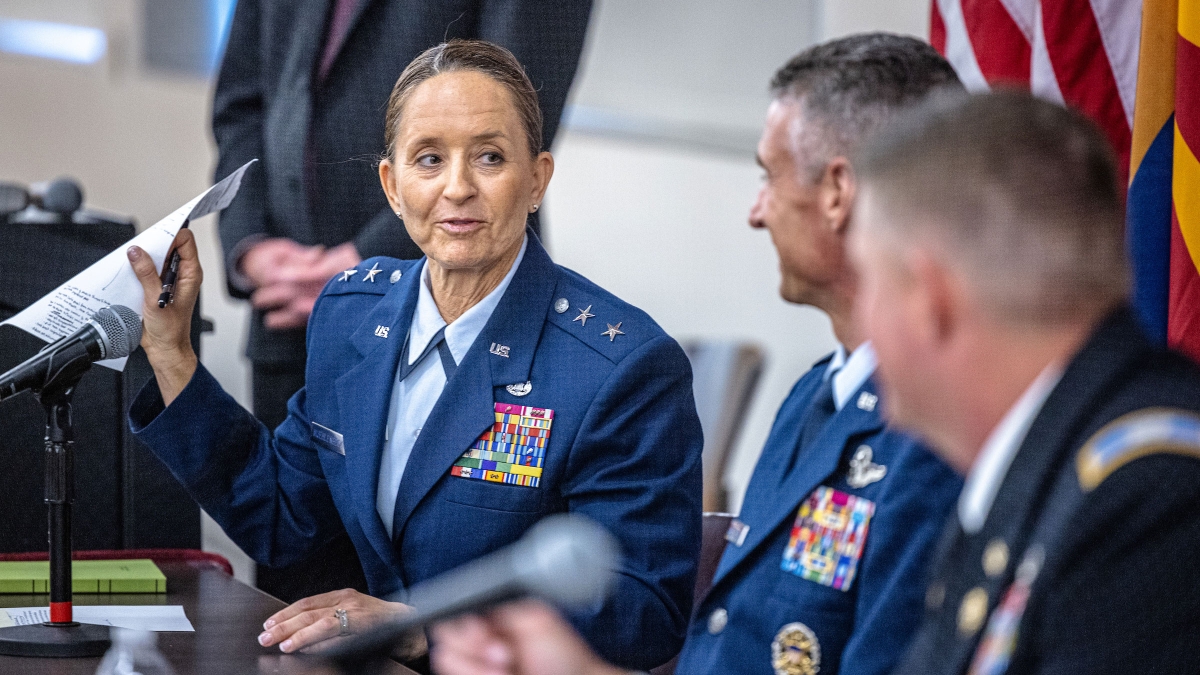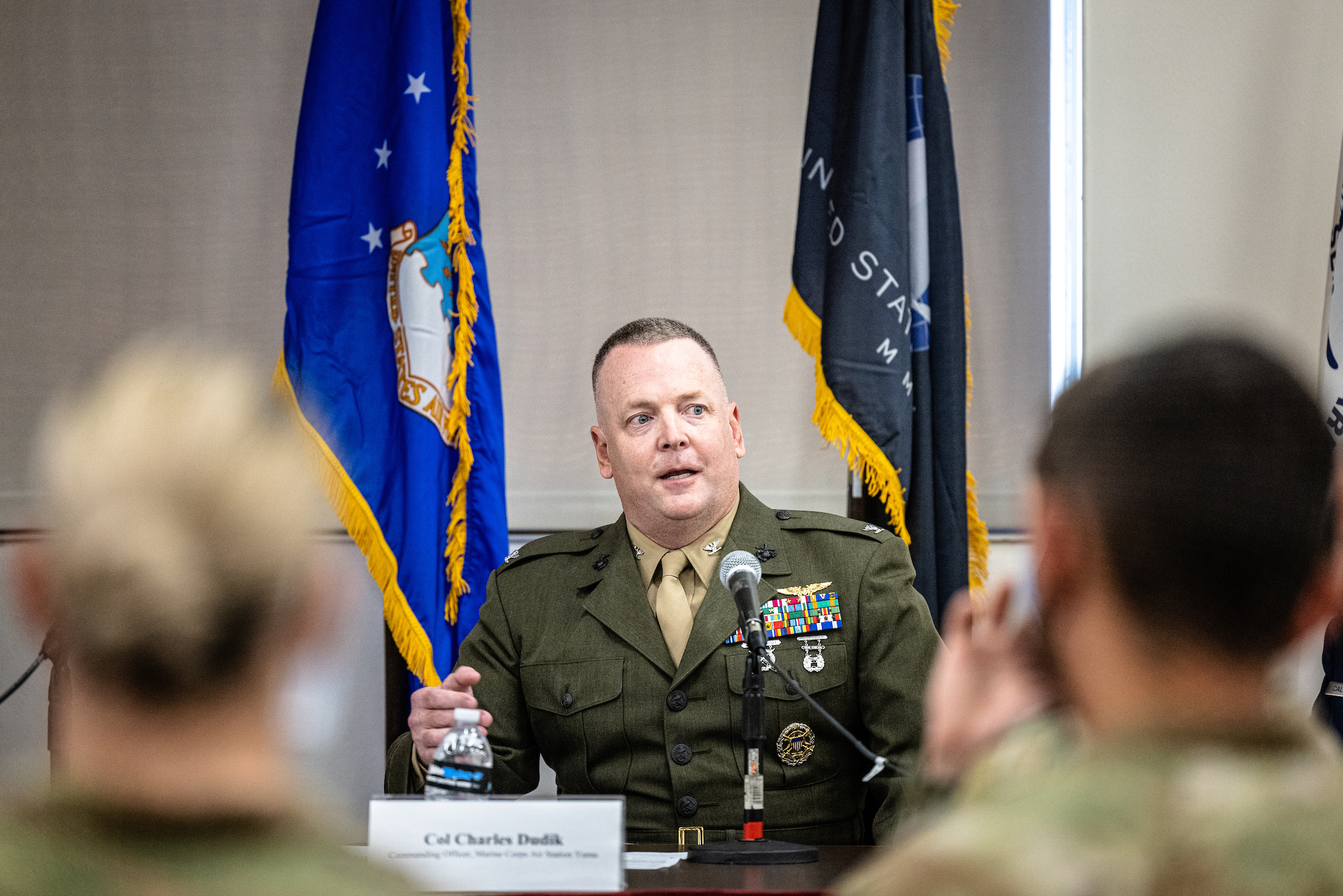America’s future military will have to be faster, smarter and technologically savvy, possess streamlined procurement and become more nimble if they are to remain a global superpower.
That was the consensus of an all-star panel of Arizona military leaders who assembled Friday at the Memorial Union on the Tempe campus as part of Arizona State University’s Salute to Service.
“If we are to win our nation’s wars in the future, we have to be able to innovate and change the way we think and the trust we have in our airmen and women,” said Brig. Gen. Gregory Kreuder, commanding general of the of the 56th Fighter Wing at Luke Air Force Base, which is home to approximately 7,000 service members. “We have to be able to give them the tools they need quickly, rapidly and get out of their way.”
Kruder’s comment was made during a discussion on the great power competition between Russia, China and the United States, and what the military will look like in the next two decades.
In addition to Kreuder, the Nov. 5 panel also featured Maj. Gen. Kerry Muehlenbeck, Arizona adjutant general; Col. Jarrod Moreland, garrison commander, Fort Huachuca; Col. Charles Dudik, commander, Marine Corp Air Station, Yuma; and Col. Lea Calderwood, commander, 355th Medical Group, Davis-Monthan Air Force Base. Patrick Kenney, dean of The College of Liberal Arts and Sciences, handled moderating duties.
“The university and The College are very proud to host these kinds of distinct panels and have this many young people simultaneously striving towards college degrees as well as becoming officers in the military,” Kenney said. “The university is very happy to play this role.”
ASU’s Office of University Affairs sponsored the event, which drew about 100 people, many of them ASU's ROTC members. Titled “Great Power Competition: Russia and China,” the goal of the panel was to address future threats to the nation through its two main adversaries.
One of the future challenges will be airspace competition, said Muehlenbeck.
“China and Russia are moving the needle on technological advancements in terms of electronic warfare, artificial intelligence and manufactured intelligence,” Muehlenbeck said. “We’re getting to a point now where we’re not going to enjoy air superiority like we did in the last 20 years. It’s important that we have agile airmen who are ready to engage in just about any environment.”
Engagement with China wouldn’t be pretty, Moreland said, given the country’s rapid nuclear buildup over the past decade, the recent announcement of a hypersonic missile and the recent discovery of 250 planned long-range missile silos by open-source military analysis.
And there’s not much that can be done to stop them, according to Moreland.
“As far as doing anything about it on their sovereign soil, I don’t think there’s really much we can do without instigating a war, and we’re not looking forward to that,” said Moreland, who added that good intelligence can help the military figure out a forward path of deterrence.
China is also winning the war on other fronts, including challenging the United States on “the war within,” Kreuder said.
“There are two types of companies in the U.S. — those who know they’ve been hacked by China and those who don’t know they’ve been hacked by China,” Kreuder said. “China also knows how to not trigger the level of war, but they’re undermining all the liberal institutions that we’ve set up post-World War II, including agreements for free trade security, the World Trade Organization, the United Nations and NATO. So how do we ensure China does not generate conflict? Any good diplomatic maneuver has to be backed by a strong military.”
Col. Charles Dudik, commander of Marine Corps Air Station in Yuma, Arizona, speaks at the panel Friday in the Memorial Union on ASU's Tempe campus. Nearly 100 university ROTC members and other faculty and staff were in the audience. Photo by Charlie Leight/ASU News
Having a strong military presence on the world stage is crucial, Dudik said.
“Global leadership absolutely matters. You can’t do that from afar,” Dudik said. “It’s a road that means positioning in terms of an alliance with Japan or Australia or where else we’re talking about freedom. The basic concept of being present to offer credible deterrence, credible support and reassurance to allies is exactly the precise role we have to play.”
But in order to continue playing that role, the military needs to continue to improve on all fronts. That includes partnering with private business on production, speeding up procurement methods, limiting bureaucracy and improving technology and modernization, the panel said.
None of that matters, though, without strong leadership, panel members said — which sets the foundation that these young cadets in the crowd must possess.
Muehlenbeck was perhaps the most specific in what her ideal leader looked like.
“I’m looking for the service ethos, those individuals that are really called to serve,” Muehlenbeck said. “I’m looking for people who get goose bumps or a lump in the throat when the national anthem plays … and I also think I’m looking for a little bit of humility.”
Salute to Service runs through Nov. 11.
Top photo: Maj. Gen. Kerry Muehlenbeck, the adjutant general for Arizona, speaks during a lunchtime discussion panel Nov. 5 with other Arizona military leaders on “Great Power Competition: Russia and China,” at the Memorial Union on ASU's Tempe campus. Nearly 100 university ROTC members and other faculty and staff listened to the discussion moderated by Dean Patrick Kenney of The College of Liberal Arts and Sciences. The leadership stressed the need for future officers to help address the intelligence and technology requirements of the future to overcome the challenges brought on by the eastern European and Asian superpowers. Photo by Charlie Leight/ASU News
More Law, journalism and politics

ASU committed to advancing free speech
A core pillar of democracy and our concept as a nation has always been freedom — that includes freedom of speech. But what does that really mean?Higher education doesn’t have an agenda to curate a…

ASU experts share insights on gender equality across the globe
International Women’s Day has its roots in the American labor movement. In 1908, 15,000 women in New York City marched to protest against dangerous working conditions, better pay and the right to…

ASU Law to offer its JD part time and online, addressing critical legal shortages and public service
The Sandra Day O’Connor College of Law at Arizona State University, ranked 15th among the nation’s top public law schools, announced today a new part-time and fully online option for its juris doctor…

